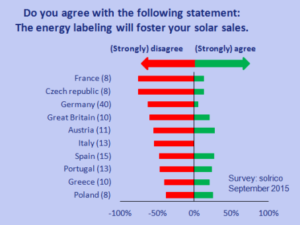Italy: Conference Highlights Installers’ Key Qualification Issues
November 15, 2012
 Held in Rome in September 2012, the conference “Qualification and Certification of Skills for Those Working in the Energy Sector” was the ideal platform to outline and debate which qualifications and certifications are necessary for installers of small-scale renewable energy systems, including solar thermal. The Italian National Agency for New Technologies, Energy and Sustainable Economic Development, ENEA, had organised the conference because time is running out: the implementation date is the 31 December of this year. By this date, the Italian regions must have launched “a training programme for installers of renewable energy systems” in accordance with Italian law no. 28, which was approved on 3 March 2011. Some sector players, however, have their doubts about whether the regions will be ready by then.
Held in Rome in September 2012, the conference “Qualification and Certification of Skills for Those Working in the Energy Sector” was the ideal platform to outline and debate which qualifications and certifications are necessary for installers of small-scale renewable energy systems, including solar thermal. The Italian National Agency for New Technologies, Energy and Sustainable Economic Development, ENEA, had organised the conference because time is running out: the implementation date is the 31 December of this year. By this date, the Italian regions must have launched “a training programme for installers of renewable energy systems” in accordance with Italian law no. 28, which was approved on 3 March 2011. Some sector players, however, have their doubts about whether the regions will be ready by then.
Giovanni Lelli, ENEA Commissioner, inaugurated a conference at which the Ministry of Industry, the Ministry of Education, the Confindustria (the main organisation representing Italian manufacturing and service companies), renewable energy industry associations, regional representatives and Italian certification bodies held their speeches. The conference was organised in the context of the EU project Compener (Competences for Sustainable Energy).
The starting point of the discussion was article 15 of Law 28. This article refers to article 14.3 of EU Directive 2009/28/EC, which states: “Member States shall ensure that certification schemes or equivalent qualification schemes become or are available by 31 December 2012 for installers of small-scale biomass boilers and stoves, solar photovoltaic and solar thermal systems, shallow geothermal systems and heat pumps. Those schemes may take into account existing schemes and structures as appropriate, and shall be based on the criteria laid down in Annex IV. Each Member State shall recognise certification awarded by other Member States in accordance with those criteria.”
The round-table that followed highlighted some key issues of installer qualification:
Law 28/2011 has partially changed existing legislation. At present, the licence to install renewable energy systems can only be obtained by fulfilling the requirements stipulated in Law 37/2008 (reorganisation of the provisions for installations of equipment inside buildings). This law demands a specific technical degree or a diploma of a higher secondary school in one of the areas listed in article 1 of Law 37/2008, including “heating, air-conditioning, cooling and refrigeration equipment”, plus a two-year employment in a company from the specific sector. All installers who fulfil these requirements are also permitted to set up small renewable heating systems according to the new Law 28, although Law 37/2008 does not particularly refer to the installation of energy systems but to housing technology in general.
This means that the mandatory requirements introduced by Law 28/2011 concern only a limited number of installers. Only those will be required to attend a particular solar thermal training course if they do not meet the requirements of Law 37/2008.
Still, the conference participants agreed in working together to motivate all installers to attend these renewable-specific training courses. The aim is to increase the overall quality of installations as stated in the EU directive. A good proposal at the conference was to provide incentive mechanisms which require the attendance of training courses that are in accordance with Law 28/2011.
Another very sensitive issue discussed at the conference was the problem of the homogeneity of qualification programmes at the national level. The representatives of renewable energy industry associations pointed out that making similar qualification schemes available in all regions was crucial to letting installers who obtained the qualification in one region also set up systems in another region. At the round-table, the representative of the Piedmont region proposed to have the regional administrators sign an agreement with predefined criteria and contents for the qualification schemes. It was also regarded as important to increase the quality and practical relevance of trainings. The bottom line of the panel discussion: Attending courses should not become just another hunt for credentials, simply increasing bureaucracy without providing technical knowledge and practical skills.
More information:
The conference (in Italian): http://www.enea.it/it/enea_informa/events/compener_20set12/Compener_20set12
http://www.compener.enea.it/
This text was written by Valeria Verga, Secretary General of the Italian solar thermal association Assolterm.


